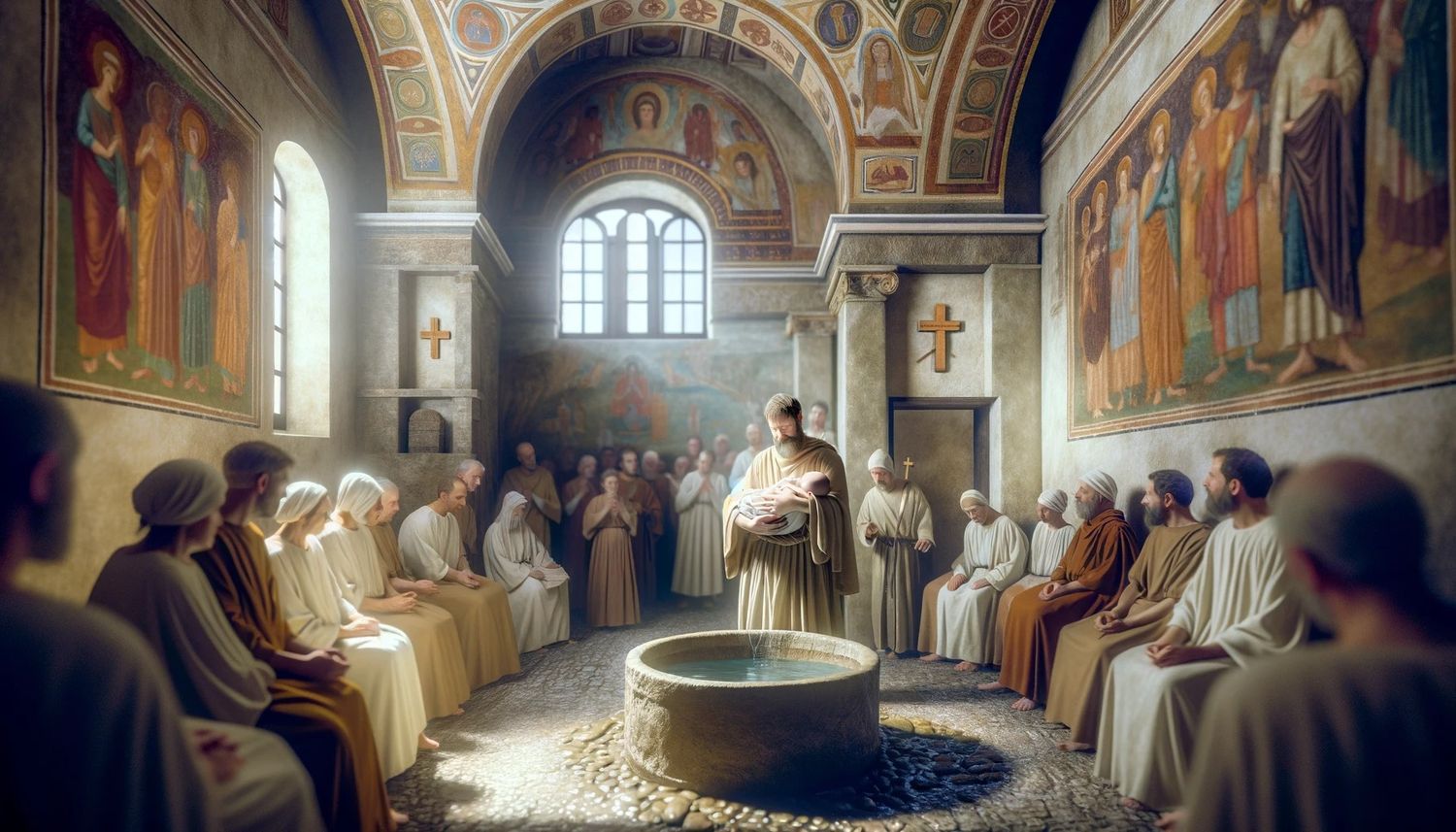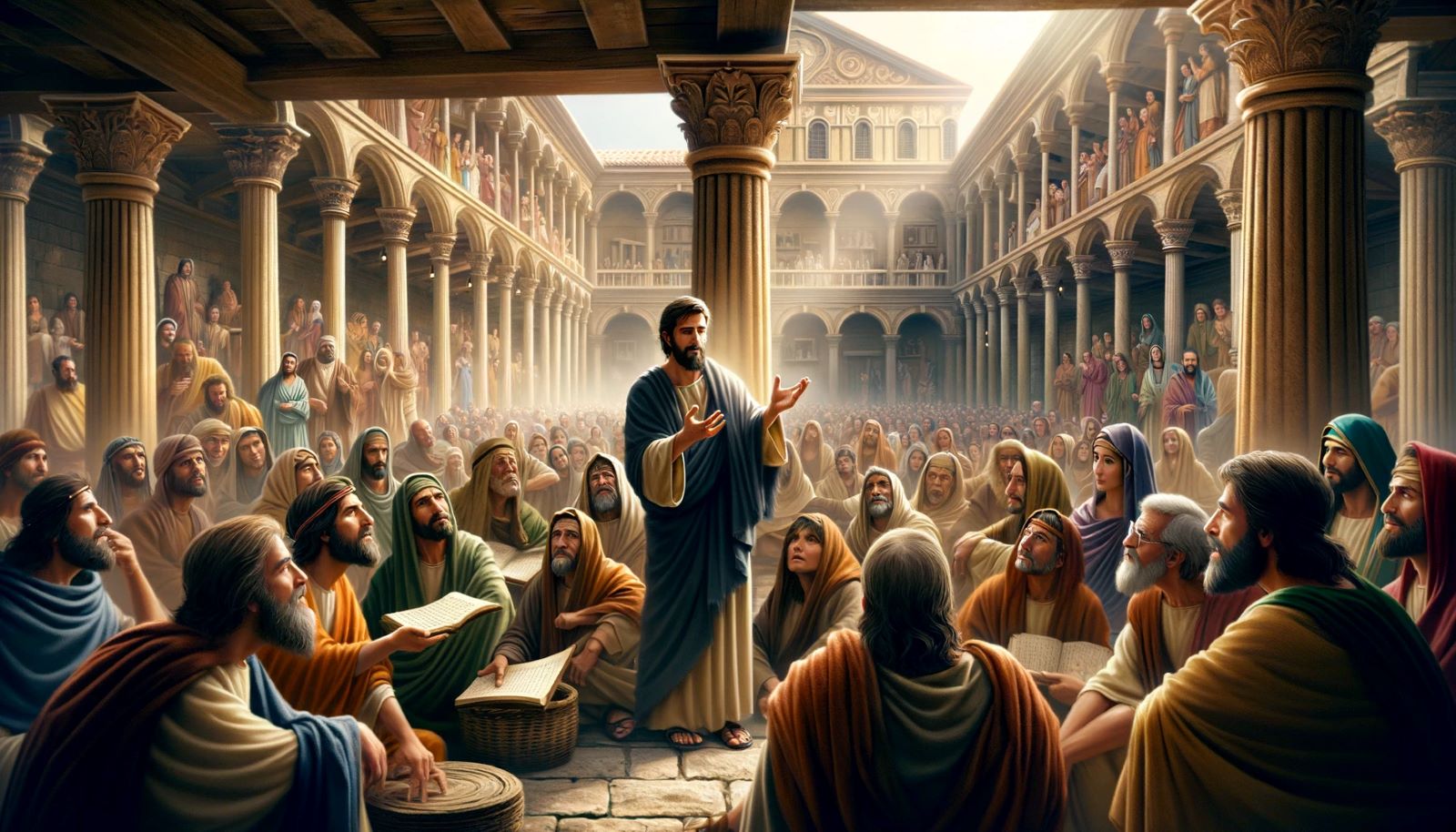Home>Bible Facts>When Were The Apostles Empowered To Begin The Mission Of Jesus


Bible Facts
When Were The Apostles Empowered To Begin The Mission Of Jesus
Published: February 18, 2024
Ericka Andersen, an editor at Christian.net, expertly merges digital strategy with content creation, focusing on faith and societal issues. Her communication skills enhance the platform's engaging narratives, fostering meaningful dialogue on belief's impact on society.
Discover the empowering of the apostles to fulfill Jesus' mission. Uncover fascinating Bible facts about the mission of the apostles and their journey. Explore the significance of this pivotal moment in Christian history.
(Many of the links in this article redirect to a specific reviewed product. Your purchase of these products through affiliate links helps to generate commission for Christian.net, at no extra cost. Learn more)
Table of Contents
Introduction
The empowerment of the apostles to begin the mission of Jesus stands as a pivotal moment in the history of Christianity. This significant event marked the transition from the earthly ministry of Jesus to the spread of His teachings and the establishment of the early Christian church. Understanding the timing and circumstances surrounding the empowerment of the apostles provides profound insight into the foundational principles of the Christian faith.
This article delves into the historical and spiritual significance of the apostles' empowerment, shedding light on the pivotal moments that led to the commencement of their mission. By exploring the commissioning of the apostles, the Day of Pentecost, the empowerment of the Holy Spirit, and the inception of the mission of Jesus, we gain a deeper understanding of the divine orchestration that shaped the early Christian movement.
Read more: Who Were Jesus Apostles
The Commissioning of the Apostles
The commissioning of the apostles represents a defining moment in the narrative of Jesus' ministry. This pivotal event took place after the resurrection of Jesus, as documented in the New Testament. The Gospels of Matthew, Mark, Luke, and John provide varying but complementary accounts of this significant occurrence.
In the Gospel of Matthew, the commissioning of the apostles is encapsulated in the Great Commission, where Jesus imparts His authority to the disciples, instructing them to go and make disciples of all nations, baptizing them in the name of the Father, the Son, and the Holy Spirit. This charge symbolizes the universal scope of the apostles' mission, emphasizing the inclusivity of Jesus' teachings.
Similarly, the Gospel of Mark portrays Jesus commissioning the apostles to preach the Gospel to all creation, emphasizing the transformative power of faith and the imperative to share the message of salvation with the world.
Luke's Gospel provides a detailed account of the commissioning, highlighting Jesus' emphasis on the fulfillment of prophecies and the necessity for the apostles to bear witness to His teachings. This underscores the continuity between the Old Testament prophecies and the ministry of Jesus, reinforcing the divine plan of redemption.
In the Gospel of John, Jesus commissions the apostles by breathing the Holy Spirit upon them, signifying the bestowal of spiritual authority and the indwelling of the Holy Spirit to guide and empower them in their mission.
The commissioning of the apostles serves as a foundational mandate for the propagation of the Christian faith. It signifies the transfer of responsibility from Jesus to His chosen disciples, empowering them to continue His work and spread the message of salvation to all corners of the earth.
This commissioning also underscores the relational aspect of discipleship, as Jesus entrusts His followers with the profound task of carrying forth His teachings and embodying His love and grace in their interactions with others.
The commissioning of the apostles lays the groundwork for the subsequent events that culminate in the outpouring of the Holy Spirit on the Day of Pentecost, marking the commencement of a new era in the history of Christianity.
This section will be followed by the next section, 'The Day of Pentecost'.
The Day of Pentecost
The Day of Pentecost holds profound significance in the timeline of the early Christian church. This momentous occasion, which occurred fifty days after the resurrection of Jesus, marked the fulfillment of a promise and the outpouring of the Holy Spirit upon the apostles and early believers.
The Book of Acts vividly portrays the events of the Day of Pentecost, describing how the apostles were gathered together in one place when suddenly a sound like a mighty rushing wind filled the house. This supernatural occurrence was accompanied by the appearance of divided tongues as of fire, which rested on each of the apostles. This dramatic manifestation signified the arrival of the Holy Spirit and the commencement of a new spiritual epoch.
As the apostles were filled with the Holy Spirit, they began to speak in diverse languages, a phenomenon that drew the attention of devout Jews from various regions who were present in Jerusalem for the feast of Pentecost. Astonished and perplexed, these onlookers marveled at the fact that the Galilean apostles were speaking in their native tongues, declaring the mighty works of God. This miraculous display of multilingual communication served as a compelling testament to the divine intervention taking place.
In response to the crowd's bewilderment, the apostle Peter delivered a powerful sermon, elucidating the significance of the outpouring of the Holy Spirit in light of the prophecies of the Old Testament. He boldly proclaimed the gospel, emphasizing the redemptive work of Jesus Christ and calling for repentance and baptism in His name for the forgiveness of sins.
The impact of Peter's sermon was profound, as three thousand individuals responded to the message and were baptized on that very day, signifying the exponential growth of the early Christian community. This transformative event catalyzed the spread of the gospel and the establishment of the church, laying the groundwork for the apostles to embark on their mission with divine empowerment and fervent zeal.
The Day of Pentecost stands as a testament to the faithfulness of God in fulfilling His promises and equipping His followers for the advancement of His kingdom. The outpouring of the Holy Spirit on this momentous day ignited a spiritual revolution that reverberated throughout the ancient world, setting in motion the unstoppable momentum of the early Christian movement.
This section will be followed by the next section, 'The Empowerment of the Holy Spirit'.
The Empowerment of the Holy Spirit
The empowerment of the Holy Spirit represents a transformative and transcendent moment in the narrative of the early Christian church. Following the ascension of Jesus, the apostles and believers were imbued with the indwelling presence and power of the Holy Spirit, marking a profound shift in their spiritual journey and collective mission.
The Holy Spirit, often referred to as the Paraclete or Comforter, was promised by Jesus as the divine advocate who would guide, comfort, and empower His followers. The fulfillment of this promise materialized on the Day of Pentecost, as the apostles were enveloped by the tangible and dynamic presence of the Holy Spirit.
The empowerment of the Holy Spirit bestowed upon the apostles and early believers a myriad of spiritual gifts and abilities essential for the fulfillment of their mission. These gifts included wisdom, knowledge, faith, healing, miracles, prophecy, discernment of spirits, speaking in tongues, and interpretation of tongues, among others. The infusion of these supernatural endowments equipped the apostles to effectively communicate the gospel, perform miraculous signs and wonders, and edify the burgeoning Christian community.
Furthermore, the empowerment of the Holy Spirit engendered a radical transformation in the hearts and minds of the apostles, emboldening them to boldly proclaim the message of salvation and fearlessly confront opposition and persecution. The once timid and apprehensive disciples were emboldened to become fearless ambassadors of the gospel, transcending linguistic, cultural, and geographical barriers to advance the kingdom of God.
The indwelling of the Holy Spirit also fostered unity, love, and communal harmony among the believers, catalyzing the formation of a vibrant and interconnected Christian community. The apostle Paul, in his epistles, expounds on the diverse manifestations of the Holy Spirit's empowerment within the body of Christ, emphasizing the interdependence and complementarity of spiritual gifts for the edification of the church.
The empowerment of the Holy Spirit stands as a testament to the divine enablement and guidance bestowed upon the apostles and early believers, propelling them to fulfill the Great Commission and establish the foundations of the Christian faith. This pivotal event underscores the indispensable role of the Holy Spirit in igniting and sustaining the flames of spiritual revival and transformation, perpetuating its relevance and significance throughout the annals of Christian history.
This section will be followed by the next section, 'The Beginning of the Mission of Jesus'.
The Beginning of the Mission of Jesus
The inception of the mission of Jesus, propelled by the empowerment of the apostles and the outpouring of the Holy Spirit, heralded a new era of spiritual fervor and evangelistic zeal. The apostles, emboldened by the divine enablement and fervent conviction, embarked on a transformative journey to fulfill the Great Commission and propagate the teachings of Jesus Christ.
Armed with the authority and anointing conferred upon them, the apostles ventured forth to various regions, transcending cultural and linguistic barriers to disseminate the message of salvation. Their unwavering commitment to the gospel and their demonstration of miraculous signs and wonders served as compelling testimonies to the transformative power of Christ's redemptive work.
The apostles' mission was characterized by unwavering dedication, sacrificial service, and unyielding perseverance in the face of formidable opposition and persecution. Their resolute proclamation of the gospel, coupled with the manifestation of the Holy Spirit's power, catalyzed unprecedented spiritual awakening and the establishment of vibrant Christian communities.
The early Christian mission, propelled by the fervor and conviction of the apostles, reverberated throughout the ancient world, transcending geographical boundaries and societal norms. The transformative impact of their ministry precipitated a paradigm shift, leading multitudes to embrace the message of hope and redemption, thereby reshaping the spiritual landscape of the era.
The apostles' unwavering commitment to the mission of Jesus, coupled with the empowerment of the Holy Spirit, engendered a profound legacy that continues to resonate in contemporary Christian faith. Their exemplary dedication, selflessness, and unrelenting passion for sharing the gospel serve as an enduring inspiration for believers across generations, underscoring the timeless relevance and potency of the mission entrusted to them.
The beginning of the mission of Jesus, facilitated by the apostles' divine empowerment and fervent resolve, stands as a testament to the transformative power of faith and the indomitable impact of the gospel. This epochal undertaking laid the cornerstone for the global expansion of Christianity, perpetuating the enduring legacy of the apostles' unwavering commitment to fulfilling the mandate entrusted to them.
This section concludes the comprehensive exploration of the empowerment of the apostles and the inception of the mission of Jesus, underscoring the profound spiritual significance and historical impact of these pivotal events.
Read more: Who Were All Of Jesus Apostles
Conclusion
The empowerment of the apostles to begin the mission of Jesus represents a transformative and epochal juncture in the annals of Christian history. The convergence of the commissioning of the apostles, the Day of Pentecost, the empowerment of the Holy Spirit, and the inception of the mission of Jesus delineates a profound narrative of divine orchestration and spiritual fervor that reverberates through the corridors of time.
The commissioning of the apostles by Jesus, encapsulated in the Great Commission, symbolizes the universal scope of their mission and underscores the relational aspect of discipleship. This foundational mandate laid the groundwork for the subsequent events that culminated in the outpouring of the Holy Spirit on the Day of Pentecost, marking the commencement of a new era in the history of Christianity.
The Day of Pentecost, with its supernatural manifestations and the transformative impact of Peter's sermon, catalyzed the exponential growth of the early Christian community. This momentous occasion underscored the faithfulness of God in fulfilling His promises and equipping His followers for the advancement of His kingdom.
The empowerment of the Holy Spirit, with its bestowal of spiritual gifts and transformative influence on the apostles and early believers, engendered a radical shift in their spiritual journey and collective mission. This divine enablement fostered unity, love, and communal harmony among the believers, catalyzing the formation of a vibrant and interconnected Christian community.
The inception of the mission of Jesus, propelled by the empowerment of the apostles and the outpouring of the Holy Spirit, heralded a new era of spiritual fervor and evangelistic zeal. The apostles' unwavering commitment to the gospel and their demonstration of miraculous signs and wonders served as compelling testimonies to the transformative power of Christ's redemptive work.
In conclusion, the empowerment of the apostles and the commencement of the mission of Jesus epitomize the indomitable spirit of faith, resilience, and unwavering commitment that characterized the early Christian movement. These pivotal events not only shaped the trajectory of Christianity but also resonate as timeless exemplars of divine empowerment and human dedication, inspiring generations of believers to ardently embrace the call to propagate the message of hope and redemption.














